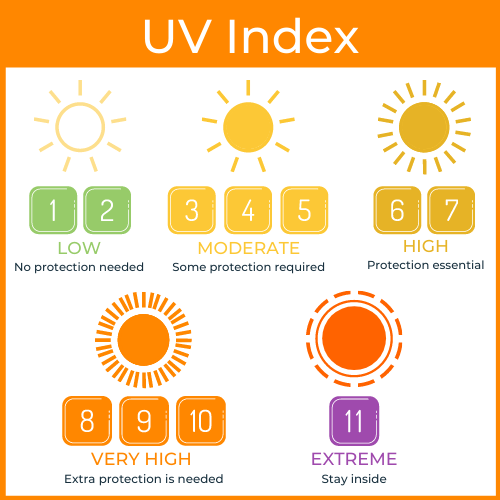
[et_pb_section admin_label=”section”]
[et_pb_row admin_label=”row”]
[et_pb_column type=”4_4″][et_pb_text admin_label=”Text”]Getting out and enjoying the sunshine is an essential part of just about every fun thing we look forward to doing in the summer, whether it’s hiking, going to the beach, riding your bike — you name it. Taking in some rays can boost your vitamin D levels, which has a demonstrable benefit to your physical and mental health, but there’s a dark side too. Direct sunlight can cause exposure to harmful UV rays which can cause skin damage, cancer, and more. For this year’s UV Safety Awareness Month, our own expert dermatologist Dr. Andrea Persaud answered some essential questions about the dangers of UV radiation, and how you can protect yourself.
Can skin cancer only be caused by over-exposure to the sun?
Over-exposure to ultraviolet rays (sunlight, tanning beds, sunlamps) is thought to be a major risk factor for skin cancer, since it can damage the DNA in our skin cells.
However, less common risk factors for the development of skin cancer include: having fair, freckled skin that burns easily, a history of blistering sunburn in youth, living in a high altitude or year-round sunny climate, a personal or family history of skin cancer, a weakened immune system (caused by factors such as HIV or receiving an organ transplant), exposure to radiation therapy, arsenic exposure, certain medical conditions, and certain high risk types of human papillomavirus (HPV).
Are sunburns really dangerous to get?
Yes — repeated unprotected exposure to ultraviolet rays found in sunlight and tanning beds damages our skin cells and causes mutations in the DNA which may not be able to be repaired. This can lead to basal cell, squamous cell and melanoma skin cancers.
What UV index would be considered “risky” or even dangerous to be out in for a long period of time?
The UV index ranks the amount of UV radiation on an 11- point scale. A UV Index of 2 or less is low, or considered safest, while a UV index of 8-11 is very dangerous. For example, if the UV index is 9, you can sunburn in 20 minutes or less. If the UV index is 4, you can sunburn within 50 minutes. If the UV index is low (2 or less) or it is a cloudy day, you can still sunburn after an hour or longer.

Does SPF level really matter?
SPF stands for “sun protection factor” and gauges sunscreen’s ability to shield your skin from the sun’s radiation. The sun emits both UVA & UVB radiation, which are responsible for skin aging & sunburns, respectively. SPF refers only to UVB rays. An SPF of 15 screens 93% of UVB rays, while an SPF 30 screens 97% UVB rays. Therefore, a daily moisturizer with SPF 15 can be sufficient. With prolonged sun exposure, I would recommend an SPF 30-50. Regardless of SPF level, reapply sunscreen every 2 hours.
If I have a darker complexion, would I need to wear a higher or lower SPF than someone with a lighter complexion?
Regardless of skin complexion, light or dark — I have the same recommendations for either — wear an SPF 30-50. There is a study in a Journal of the American Academy of Dermatology (JAAD) 2016 article entitled ”Racial Disparities in Melanoma Survival” which showed that the overall survival in cutaneous melanoma in non-whites was significantly lower than in whites. There is then a need for melanoma screening & awareness in non-white populations.
What are your tips for keeping skin healthy and protected during beach days?
I would recommend using a broad spectrum SPF 30-50 which you apply at least 30 minutes before going out. Minimize sun exposure between 10 am and 4 pm, seek shade, cover with a wide-brimmed hat, wear UV blocking sunglasses and sun-protective clothing. Reapply sunscreen every two hours. Watch out for sand, water, and snow, which reflect UV rays & increase exposure. In general, I would recommend skin self-checks once a month and an annual skin exam with your dermatologist.[/et_pb_text][/et_pb_column]
[/et_pb_row]
[/et_pb_section]



